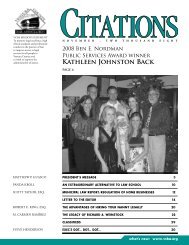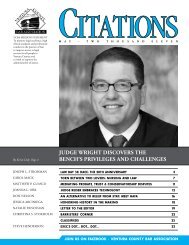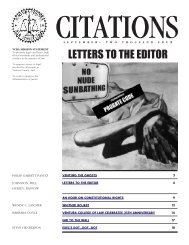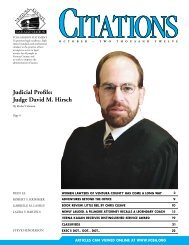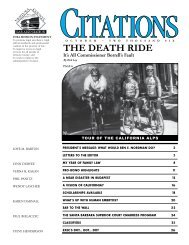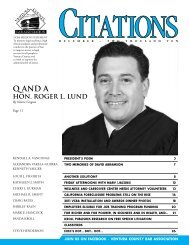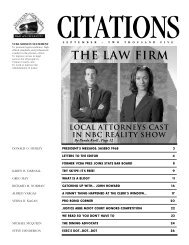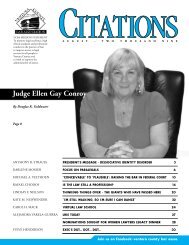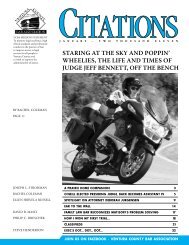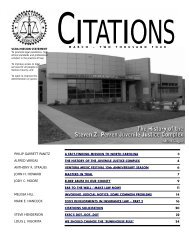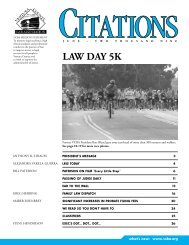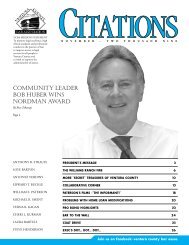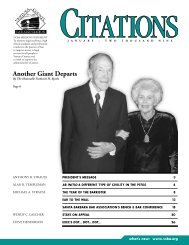ALERT: FILING PROCEDURE CHANGED - Ventura County Bar ...
ALERT: FILING PROCEDURE CHANGED - Ventura County Bar ...
ALERT: FILING PROCEDURE CHANGED - Ventura County Bar ...
You also want an ePaper? Increase the reach of your titles
YUMPU automatically turns print PDFs into web optimized ePapers that Google loves.
8 CITATIONS • AUGUST 2010<br />
FAMILY LAW DISPATCH: WHO GETS THE “BABY”<br />
(THE FAMILY BUSINESS, THAT IS!)<br />
By Gregory W. Herring<br />
Businesses are often the real “babies” at<br />
issue in marital dissolution cases. Family<br />
courts have great discretion in dividing a<br />
community’s interest in enterprises that are<br />
not dependent on one spouse’s professional<br />
certification or license to run it (such as a law<br />
or medical practice). If both spouses want<br />
the community’s interest in a business, the<br />
question becomes whether to divide it or<br />
award it entirely to one of the spouses If<br />
the interest is capable of in-kind division,<br />
the court may so order, because that is<br />
the clearest way of achieving an equal<br />
division. Family courts, however, have great<br />
discretion.<br />
The General Rule Under Brigden: In-kind<br />
Division of Community Property Assets<br />
Except Where Economic Circumstances<br />
Warrant.<br />
A party pursuing a division of the community’s<br />
interest in a business would find support<br />
in the seminal case, In re Marriage of<br />
Brigden (1978) 80 Cal.App.3d 380. Brigden<br />
established that in-kind division is the<br />
general rule. There, the Court of Appeal<br />
reversed a trial court that had awarded the<br />
husband the major community asset – shares<br />
of stock in Logicon, Inc., a corporation for<br />
which he worked and was on the board of<br />
directors.<br />
The Court held that the trial court’s failure<br />
to award the wife half of the shares outright<br />
resulted in an unequal division of property<br />
in violation of Family Code section 2550.<br />
(Section 2550 provides for the equal division<br />
of community estates.) It also held that,<br />
although section 2601 provides an exception,<br />
allowing an award of one asset entirely to one<br />
party, it only applies as a limited exception<br />
“where economic circumstances warrant.”<br />
(Section 2601 provides, “[w]here economic<br />
circumstances warrant, the court may award<br />
an asset of the community estate to one party<br />
on such conditions as the court deems proper<br />
to effect a substantially equal division of the<br />
community estate.”)<br />
The Court emphasized that “economic<br />
circumstances” should be narrowly<br />
interpreted:<br />
“Equal in kind division avoids valuation<br />
problems. It eliminates the need to<br />
place a disproportionate risk of loss on<br />
either party, is impervious to charges<br />
of favoritism, and apportions the risk<br />
of future tax liabilities equally. It also<br />
accomplishes an immediate division of<br />
property and provides the parties with<br />
the most post-dissolution economic<br />
stability.”<br />
Brigden’s Limitations:<br />
Blind reliance on Brigden, however, would<br />
not be advised. The particular facts of<br />
that case and the harsh collateral effects<br />
of the stock award to the husband were<br />
what irritated the Court of Appeal and<br />
apparently led to the decision to reverse.<br />
For instance, Logicon’s value more than<br />
tripled from the time of trial to the time of<br />
appeal. The husband, as an officer, likely<br />
knew of that possibility at the time of trial.<br />
He was awarded the stock without having to<br />
provide the wife any security. He had inside<br />
knowledge as to when to eventually purchase<br />
her shares at the lowest prices.<br />
Brigden itself discussed potential situations<br />
that might not warrant an in-kind division:<br />
“Though it is usually possible to divide<br />
[stock] in kind, it does not follow that it<br />
always can be done without impairment.<br />
Were the stock at issue here stock in a close<br />
corporation . . . or shown to be essential<br />
to Husband’s ability to earn a living then<br />
economic circumstances would perhaps<br />
warrant the award of the entire block of<br />
stock to Husband upon conditions effecting<br />
a substantially equal division of property.”<br />
State of the Law: Family Courts have<br />
Great Discretion and the Fight over<br />
In-kind Divisions Turn on Whether<br />
“Economic Circumstances” Require<br />
Alternative Awards.<br />
The same year as Brigden, the Court of<br />
Appeal issued its opinion in Marriage of<br />
Clark (1978) 80 Cal.App.3d 417, which had<br />
the opposite result.<br />
In Clark, the family court awarded to the<br />
husband all of the shares of capital stock<br />
the parties owned in a close corporation.<br />
Although the wife wanted half the stock<br />
(which itself comprised 50 percent of all the<br />
corporation’s stock), the husband testified<br />
that it would be disastrous to allow her<br />
to own any shares because approximately<br />
60-70 percent of the company’s work<br />
was performed for a government agency<br />
that was ”very conscious of everybody in<br />
the organization.” The other business<br />
partner testified that he objected to any<br />
non-participating minority shareholders,<br />
and corroborated the testimony that the<br />
customers of the business were very sensitive<br />
to any internal conflict in the business.<br />
The Court of Appeal confirmed that “. . . the<br />
court has the discretion to award corporate<br />
stock in a closely held company where<br />
justified by economic circumstances. . . .<br />
Here, the court was apparently impressed<br />
with the testimony . . . that the principal<br />
clients of the business might dislike a change<br />
in the stock ownership, and possibly transfer<br />
their business elsewhere, and that [the<br />
partner] was sincere in his statement that<br />
he would close the business if [the wife]<br />
was a minority stockholder. Threat or not,<br />
[the partner], as a 50 percent stockholder,<br />
could legally dissolve [the company], and<br />
the trial judge obviously did not want to<br />
take a chance that this valuable asset might<br />
be dissipated. . . . we cannot say that [the<br />
court] abused its discretion . . . as a matter<br />
of law.”<br />
The following year, in In re Marriage of<br />
Connolly (1979) 23 Cal.3d 590, 602, the<br />
California Supreme Court expressly limited<br />
Brigden to its “unique facts.” It reasoned:<br />
“. . . [Section 2550] was intended to, and<br />
does, vest in the court considerable discretion<br />
in the division of community property in<br />
order to assure that an equitable settlement<br />
is reached. In particular cases, strict ‘in<br />
kind’ divisions . . . may cause, rather than<br />
avoid, financial inequalities. A spouse with<br />
a high income may be able to afford to retain<br />
high-risk assets while an unemployed spouse<br />
wholly dependent upon spousal support may



